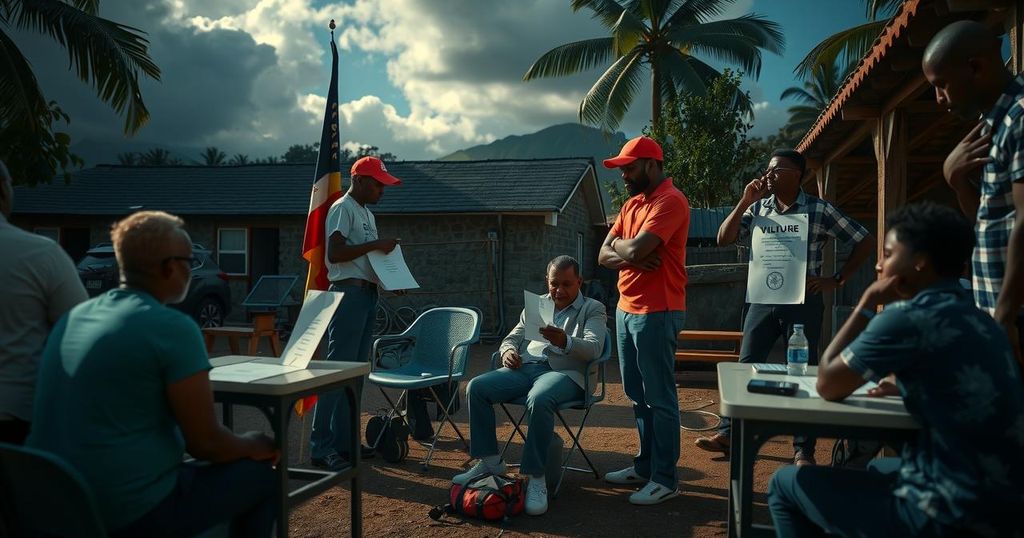Mauritius conducted a parliamentary election influenced by recent political scandals, including leaked phone calls involving politicians. Prime Minister Pravind Jugnauth faced opposition from Navin Ramgoolam’s Alliance of Change. Voter turnout reached 70% amid concerns over governance and civil liberties, with results expected soon. The election reflects broader issues of corruption and political legacy in this historically stable nation.
Mauritius held a closely contested parliamentary election on Sunday amid rising economic and political tensions following a scandal involving the leak of secretly recorded phone conversations of various political figures and journalists. The election takes place in the context of a recent landmark agreement with Britain ceding sovereignty over the Chagos Islands to Mauritius. Prime Minister Pravind Jugnauth was expected to leverage the deal for re-election, but the phone-tapping controversy raised concerns regarding civil liberties and the integrity of the democratic process. In the battle for control of the National Assembly, two primary factions emerged: Jugnauth’s Militant Socialist Movement and the opposing Alliance of Change led by former Prime Minister Navin Ramgoolam. Both groups campaigned on promises of economic relief for the populace. Reports indicated a voter turnout of approximately 70 percent by the time polls closed, with results anticipated to be announced on Monday. Security forces were deployed to polling stations, supervised by observers from the African Union. Despite the potential for fraud raised by Ramgoolam, he noted that the voting proceeded without major difficulties. Each leader expressed confidence in their respective parties’ chances, with Ramgoolam declaring, “We are heading towards a big victory tomorrow. The people are waiting for this liberation.” Similarly, Jugnauth claimed the electorate appreciated his administration’s achievements, asserting, “We are confident of winning because the people appreciate our record.” Analysis suggests that economic stability remains a pressing concern for the nation, which has historically thrived since gaining independence in 1968. Issues of corruption and diminished civil liberties have become critical, prompting scrutiny regarding the government’s effectiveness and integrity. Recent incidents during the Covid-19 pandemic, including procurement scandals and increased police scrutiny of opposition parties, have exacerbated fears about governance deficits. Political leadership in Mauritius has largely alternated among a few influential families since independence, raising questions of nepotism and legacy politics. The election showcased rising opposition forces, notably the Linion Reform alliance that campaigned against established figures. Amid this politically charged atmosphere, the recent Chagos deal, while viewed as progress for decolonization by the government, has faced skepticism regarding its long-term implications, especially concerning foreign military interests in the region.
The political landscape of Mauritius is characterized by a robust democratic tradition, although recent events have called this stability into question. Since gaining independence from Britain in 1968, political leadership has rotated predominantly among three families, which has fueled public discontent over issues of nepotism and corruption. The recent phone-tapping scandal exemplifies the growing concerns regarding civil liberties and governance practices. The Chagos Islands agreement represents a significant geopolitical event, framing the current electoral atmosphere as one where past legacies and future challenges converge amid community aspirations for economic stability.
In conclusion, the recent parliamentary election in Mauritius takes place against a backdrop of political upheaval and social concern over governance. The outcome will not only determine the immediate political leadership but also address pressing issues of economic stability and public trust. The contentious atmosphere, marked by a significant scandal and challenges to civil liberties, underscores the fragile nature of democracy in the region.
Original Source: www.guampdn.com






